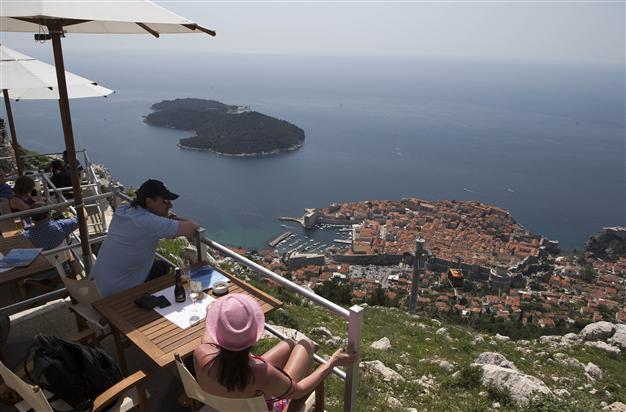Croatia's Dubrovnik votes on golf, real estate project
ZAGREB - Agence France-Presse

Dubrovnik old town is pictured from Srdj, the hill above the city, Friday, April 26, 2013. The residents of this scenic Croatian Adriatic sea resort will hold a referendum on Sunday April 28, 2013, whether to allow the 1.1-billion euros ($1.4 billion) golf park development project on the hill above the city that many claim endangers their ancient city, often dubbed the Pearl of the Adriatic, and the outcome could have serious consequences on the future of foreign investments in Croatia. AP photo
Residents of Dubrovnik voted on Sunday in a referendum on whether to approve a controversial one-billion euro project to build golf courses, houses and hotels on a tree-lined mountain above Croatia's Adriatic port town.They were being asked to vote on a project by Israeli businessman Aaron Frenkel and Australian golfer Greg Norman, the former world number one, that critics say will spur massive and ugly real estate development.
In a first such referendum, some 38,000 eligible voters were asked whether they supported a "master plan that will allow construction of golf courses, houses and hotels" on Srdj mountain above the medieval tourist town.
For the project to be rejected, more than half of the voters would have to say "no" in the southern town which hosts some 700,000 visitors each year. Norman, known as the Great White Shark for his aggressive style in golfing, was to open his golf academy at the project site, local media reported.
But several local non-profit groups have warned against a "sham," arguing the project was primarily focused on obtaining grounds for real estate construction in this exceptionally attractive area.
"The volume of construction is scary, while investments in golf are only five percent of the total amount," said activist Djuro Capor.
The project calls for construction of two golf courses, two hotels, 240 villas and 400 apartments on some 310 hectares (766 acres) of the land.
The investors accused the activists of "manipulation," with Ivan Kusalic, Dubrovnik's project manager, saying they were "trying to scare people by presenting the project only as a vast real estate venture.
"We have developed a project that will bring prosperity to Dubrovnik, create jobs and contribute to the extension of a tourist season," Kusalic said.
Croatia registered 12.3 million tourist visits in 2012, more than five percents more than in 2011, a record for the Adriatic country of 4.2 million which is to join the European Union on July 1.
Dubrovnik was first listed a UNESCO World Heritage Site in 1979 for its unique pre-medieval port. Some parts of its fortress were damaged when the then Yugoslav army bombed it in in 1991, during Croatia's independence war.
















